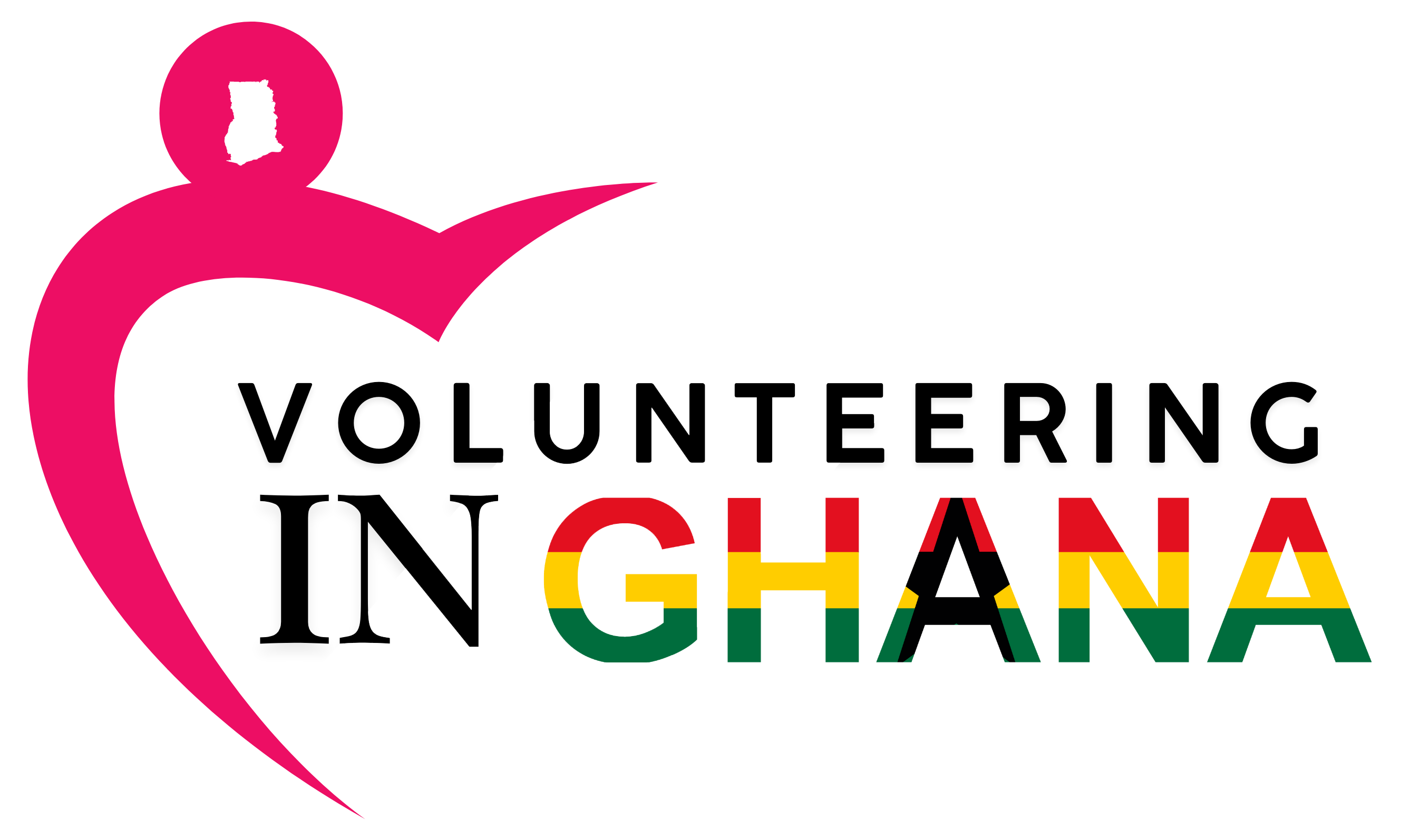about ghana
Are you considering volunteering or doing your internship abroad?
Ghana is the destination of choice: A Land of Political Stability, Peace, Rich History, Diverse Culture and Art, Warm Hospitality, and Attractive Tourist Sites.
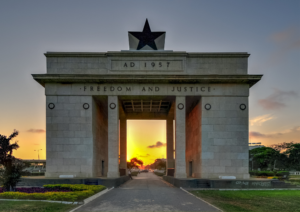 Ghana, located in West Africa along the Gulf of Guinea, is one of Africa’s most remarkable nations, renowned for its deep-rooted history, cultural diversity, and peaceful environment. Covering an area of approximately 238,533 square kilometers, Ghana shares borders with Côte d’Ivoire to the west, Burkina Faso to the north, Togo to the east, and the Atlantic Ocean to the south. The country features a diverse landscape, including coastal plains, rolling savannas, lush rainforests, and scenic mountains, making it a unique geographical destination. Its tropical climate consists of wet and dry seasons, fostering rich biodiversity and a variety of ecosystems. As of 2024, Ghana has an estimated population of over 33 million people, with a mix of urban and rural communities contributing to its dynamic economic and social fabric.
Ghana, located in West Africa along the Gulf of Guinea, is one of Africa’s most remarkable nations, renowned for its deep-rooted history, cultural diversity, and peaceful environment. Covering an area of approximately 238,533 square kilometers, Ghana shares borders with Côte d’Ivoire to the west, Burkina Faso to the north, Togo to the east, and the Atlantic Ocean to the south. The country features a diverse landscape, including coastal plains, rolling savannas, lush rainforests, and scenic mountains, making it a unique geographical destination. Its tropical climate consists of wet and dry seasons, fostering rich biodiversity and a variety of ecosystems. As of 2024, Ghana has an estimated population of over 33 million people, with a mix of urban and rural communities contributing to its dynamic economic and social fabric.
Ghana has set itself apart as a beacon of democracy, a land of rich traditions, and a hub of historical and natural attractions that continue to draw visitors from around the world. From its vibrant arts and cultural heritage to its warm hospitality and breathtaking tourist destinations, Ghana offers a unique blend of past and present that makes it a must-visit destination. This article delves into Ghana’s political stability, peace, history, culture, art, hospitality, landscape, regions, food diversity, and must-visit tourist sites.
Political Stability and Peace
Ghana is one of the most politically stable countries in Africa, often cited as a model of democracy on the continent. Since transitioning from military rule to a democratic government in 1992, Ghana has maintained a strong multi-party democracy with peaceful transitions of power. The nation’s electoral process is widely regarded as transparent and fair, with active participation from both citizens and civil society organizations.
The presence of a robust judicial system and independent institutions further strengthens democracy in Ghana. The country has experienced several successful presidential transitions, showcasing its commitment to upholding democratic principles. In comparison to many other African nations that struggle with political unrest, Ghana stands out as an example of stability and peace. The absence of major internal conflicts and the promotion of national unity have created a conducive environment for economic growth and foreign investments.
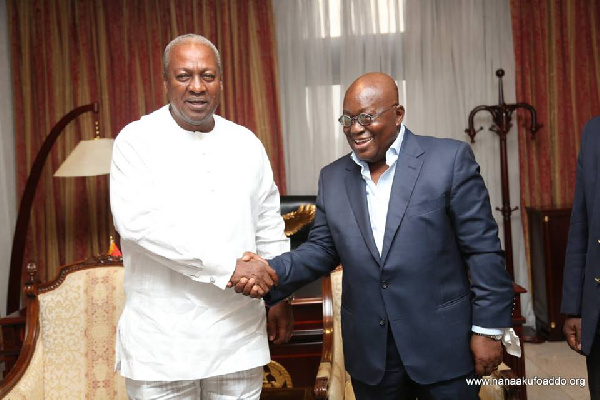
Rich History
Ghana’s history is deeply intertwined with African civilization, colonialism, and the fight for independence. The region that is now Ghana was once home to powerful ancient empires, including the Ghana Empire (not to be confused with modern Ghana) and later the Ashanti Empire. The Ashanti Kingdom, with its capital in Kumasi, played a dominant role in West African history, known for its military prowess and economic strength.
During the transatlantic slave trade, Ghana was a major hub, with forts and castles along its coastline serving as centers for the trading of enslaved Africans. Some of the most notable historical sites, such as Cape Coast Castle and Elmina Castle, stand as solemn reminders of this dark period in history. Today, these castles are UNESCO World Heritage Sites, attracting visitors seeking to learn about Ghana’s past.
Ghana made history on March 6, 1957, by becoming the first sub-Saharan African country to gain independence from colonial rule under the leadership of Dr. Kwame Nkrumah. This monumental achievement marked the beginning of African liberation movements, inspiring other nations to fight for their freedom.
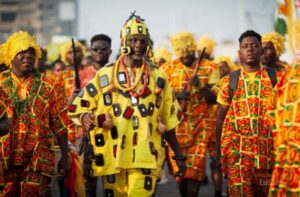 Diverse Culture and Art
Diverse Culture and Art
Ghana is home to over 100 ethnic groups, each with its own unique traditions, languages, and customs. The major ethnic groups include the Akan (which encompasses the Ashanti, Fante, Akuapem, and Akyem), Ewe, Ga-Dangme, Mole-Dagbani, and Guan. Despite these ethnic differences, Ghanaian culture is deeply united by shared values, respect for elders, and strong communal ties.
Traditional festivals are a major part of Ghanaian life. Some of the most celebrated festivals include:
- Aboakyer Festival (Winneba) – Celebrated by the Effutu people, this festival involves a thrilling deer hunt to honor their ancestors.
- Homowo Festival (Accra) – A Ga festival marking the end of famine, celebrated with drumming, dancing, and the sprinkling of Kpokpoi (a traditional meal).
- Hogbetsotso Festival (Volta Region) – Celebrated by the Anlo Ewe people to commemorate their migration from Notsie in present-day Togo.
- Adae Festival (Ashanti Region) – A celebration in honor of ancestors and the Ashanti king.
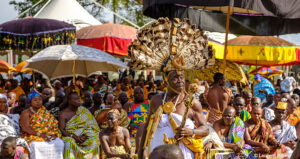 Art is an integral part of Ghanaian culture, with its expression seen in textiles, sculpture, painting, and beadwork. The world-famous Kente cloth, originally from the Ashanti and Ewe people, is a symbol of African heritage and royalty. Adinkra symbols, often printed on fabric and used in pottery and architecture, convey deep philosophical messages.
Art is an integral part of Ghanaian culture, with its expression seen in textiles, sculpture, painting, and beadwork. The world-famous Kente cloth, originally from the Ashanti and Ewe people, is a symbol of African heritage and royalty. Adinkra symbols, often printed on fabric and used in pottery and architecture, convey deep philosophical messages.
Ghana’s music and dance scene is equally vibrant. Highlife music, which originated in Ghana, blends traditional African rhythms with Western instruments. Modern-day Ghanaian artists continue to evolve the music scene with Afrobeats and Hiplife, gaining international recognition.
Warm Hospitality of the Ghanaian People
One of the most remarkable aspects of Ghana is its people. Known for their warmth, friendliness, and generosity, Ghanaians welcome visitors with open arms. The Akan phrase “Akwaaba,” meaning “Welcome,” is deeply ingrained in the country’s culture. Whether in cities or rural areas, visitors often find themselves embraced by the kindness of locals who are always eager to share their culture and traditions.
The Ghanaian concept of “Ubuntu” (meaning “I am because we are”) emphasizes community, mutual support, and togetherness. This spirit of unity extends to visitors, making Ghana a comfortable and enjoyable place to explore.
Landscape and Regions
Ghana’s landscape is diverse, ranging from coastal plains and savannas to lush forests and mountain ranges. The country is divided into 16 administrative regions, each with its unique geography and cultural significance:
- Greater Accra Region – The smallest but most urbanized region, home to the capital city, Accra.
- Ashanti Region – Known for its rich cultural heritage and the historic Ashanti Kingdom.
- Western and Western North Regions – Famous for beautiful beaches, cocoa farms, and natural reserves.
- Central Region – Home to Cape Coast Castle and Elmina Castle.
- Volta Region – Known for Wli Waterfalls (Highest waterfall in west Africa), Mount Afadja (Ghana’s highest peak), and unique Ewe culture.
- Eastern Region – Features the scenic Akuapem Hills, Aburi Botanical Gardens, and Lake Volta.
- Northern, Savannah, and North East Regions – Characterized by vast savannas and Mole National Park.
- Upper East and Upper West Regions – Rich in indigenous culture and historical sites like Paga Crocodile Pond and Wechiau Hippo Sanctuary.
- Bono, Bono East, and Ahafo Regions – Known for natural attractions and rich agriculture.


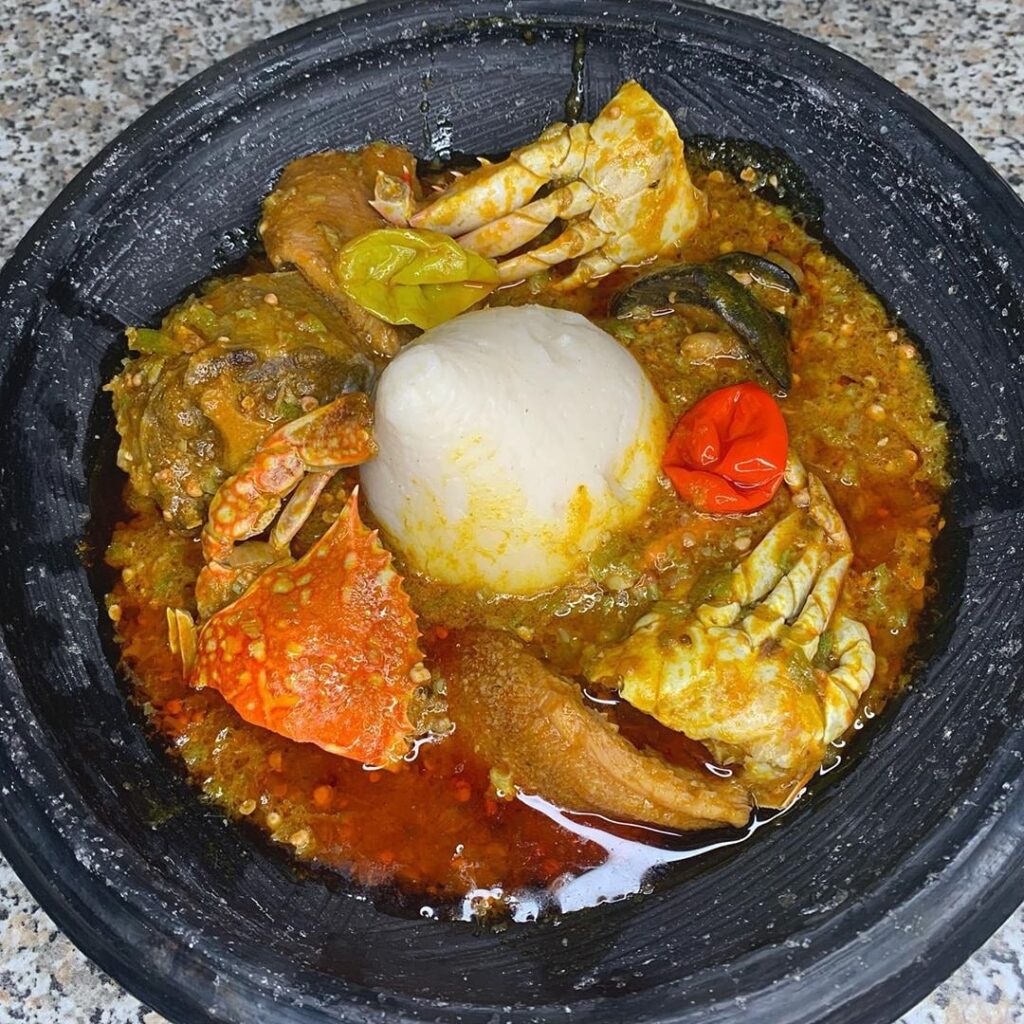 Ghanaian Food Diversity
Ghanaian Food Diversity
Ghanaian cuisine is as diverse as its people, offering a variety of flavors and dishes that are deeply rooted in tradition. Meals vary across regions, incorporating local ingredients such as maize, yams, plantains, and fish. Some notable dishes include:
- Jollof Rice – A well-seasoned rice dish cooked with tomatoes, onions, and spices, often served with meat, fish, or fried plantains.
- Fufu and Light Soup – A starchy dish made from pounded cassava and plantains, commonly eaten with a spicy soup made from tomatoes, fish, or meat.
- Banku and Tilapia – A fermented maize and cassava dough dish, usually served with grilled tilapia and spicy pepper sauce.
- Waakye – A rice and beans dish often served with spaghetti, fried plantains, and meat or fish.
- Kenkey and Fish – A fermented maize dough dish wrapped in banana leaves, served with fried fish and pepper sauce.
- Tuo Zaafi – A northern dish made from maize or millet, typically eaten with a nutritious green soup.
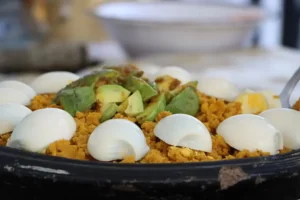 These traditional dishes reflect the agricultural wealth of the country and showcase the creativity of Ghanaian culinary practices.
These traditional dishes reflect the agricultural wealth of the country and showcase the creativity of Ghanaian culinary practices.
Ghana stands out as a land of peace, rich history, cultural diversity, and culinary excellence, making it one of the most fascinating countries in Africa. Whether you are looking to explore its historical landmarks, enjoy its diverse cuisine, or experience the warmth of its people, Ghana is truly a place worth discovering.
